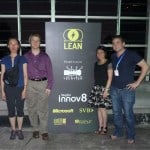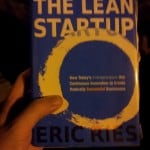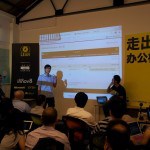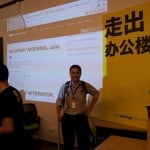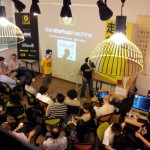Lean Startup Machine Shanghai Experience. Entrepreneurship Can Be Measured
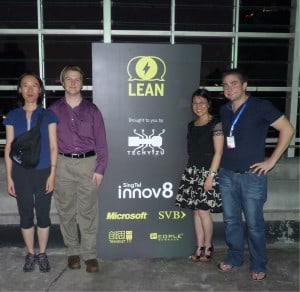 What an amazing weekend that passed at the Lean Startup Machine here in Shanghai, China (one of the main reasons for me taking my long awaited trip to Shanghai). Its Tuesday evening and I’m finally catching up on the blog post, so many overwhelming calls and reactions since pitching on Sunday night. It was exhausting, but mind blowing – and rather eye opening and hard to accept sometimes (my new “idea” and “baby” Weibo Agent) I have participated in a Hong Kong BootUP weekend and organized / hosted 5 Startup Weekends (3 in Shenzhen, 1 in Seattle, and 1 in Guangzhou), so obviously I knew basically what to expect. It actually helps putting it back into full 360 degree perspective as an entrepreneur / participant really helped me understand how to organize future events. So that also was a big value add.
What an amazing weekend that passed at the Lean Startup Machine here in Shanghai, China (one of the main reasons for me taking my long awaited trip to Shanghai). Its Tuesday evening and I’m finally catching up on the blog post, so many overwhelming calls and reactions since pitching on Sunday night. It was exhausting, but mind blowing – and rather eye opening and hard to accept sometimes (my new “idea” and “baby” Weibo Agent) I have participated in a Hong Kong BootUP weekend and organized / hosted 5 Startup Weekends (3 in Shenzhen, 1 in Seattle, and 1 in Guangzhou), so obviously I knew basically what to expect. It actually helps putting it back into full 360 degree perspective as an entrepreneur / participant really helped me understand how to organize future events. So that also was a big value add.
Plus I’m just getting addicted to this trending startup industry. Event after event, its pulling me deeper and deeper in.
Lean Startup Machine compared to Startup Weekend
Lean Startup Machine is not exactly like a Startup Weekend. Lean startup machine is much more lecture / training / sharing / learning rather than “no talk, all action” as in a Startup Weekend. We focused on customer validation, to ensure that the customer actually WANTS this product or service BEFORE building it. That is the core of lean methodology – to stop wasting you and your startup’s time building things that your customer and market DO NOT WANT!
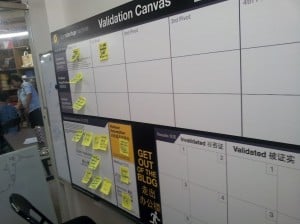 Friday night was still pitching your ideas and team formation. But afterwards, we spent a lot of time in a lecture to apply lean methodology to our ideas and teams. Saturday morning was spent in a lecture hall listening to speakers and panels discuss Lean Startup experiences, pivots (changing your business model), perseverance. The speakers showed how applying lean methodology is hard, because its not “fame and glory” – its hard work listening to customers, doing focus groups, and slowly tweaking your startup as you go along. Your friends and family may compare you to your competitors, as they are more high profile with big investments and huge PR campaigns, but you, as a lean startup, will slowly hone in on your target market and build a startup that customers want – not what you and investors THINK they want.
Friday night was still pitching your ideas and team formation. But afterwards, we spent a lot of time in a lecture to apply lean methodology to our ideas and teams. Saturday morning was spent in a lecture hall listening to speakers and panels discuss Lean Startup experiences, pivots (changing your business model), perseverance. The speakers showed how applying lean methodology is hard, because its not “fame and glory” – its hard work listening to customers, doing focus groups, and slowly tweaking your startup as you go along. Your friends and family may compare you to your competitors, as they are more high profile with big investments and huge PR campaigns, but you, as a lean startup, will slowly hone in on your target market and build a startup that customers want – not what you and investors THINK they want.
You spend the majority of the weekend with the poster board template on the right here. And the concept is to make your customer, problem, and solution hypothesis, and then assumptions – and test the riskiest assumption by surveying customers outside to see if its valid or invalid. Do this as much as possible running in and out of the building to re-iterate and define your startup.
Pretty cool concept. But yes, it takes discipline.
Some people have said that Lean Startup Machine is the pre-weekend to Startup Weekend. That, ideally, you would first attend a lean startup machine weekend to pitch the idea, work over the weekend to VALIDATE this idea, decide if it is worth building, focusing on pivoting or persevering, and honing in on what product specs your target customer would actually want. Then you can take it to a hackathon or to Startup weekend event and build it.
Maybe one day these events and meetups will be used to develop new businesses and startups, and will become the foundation of entrepreneurship.
Lean Startup Machine is about helping entrepreneurs understand that its not “magic” and that entrepreneurship can be measured.
Results from Taking my Idea to the weekend
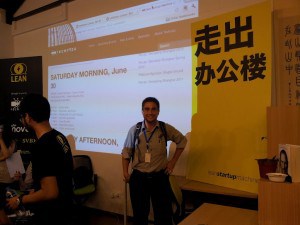 I’ll be honest, I was much more nervous than normal during the weekend. hosting a startup weekend is less stress than being an idea “pitcher” and a team leader. Friday night I pitched my idea, and I was worried maybe the room wouldn’t like it. Maybe they wouldn’t see the need for it. I had to build a team, I was scrutinized, entrepreneurs would come to me after the Friday pitch as they decided which of the ideas to vote for, and I was a bit… cocky. I hate having to justify myself. But I had to “suck it up” and I was able to form a decent team of foreigners and Chinese, operations, IT, legal. Xiaowen (who was introduced to me by Ricky) is a rockstar Chinese female programmer with USA education, Yi Zhang is another Chinese female IT product manager, Jacob an American with tons of China business and process flow, Nicola an italian lawyer helping Europeans enter the China market for the past 7 years, and my Shenzhen friend Huck Liang a chinese technical and logistic guru. Pretty sweet group.
I’ll be honest, I was much more nervous than normal during the weekend. hosting a startup weekend is less stress than being an idea “pitcher” and a team leader. Friday night I pitched my idea, and I was worried maybe the room wouldn’t like it. Maybe they wouldn’t see the need for it. I had to build a team, I was scrutinized, entrepreneurs would come to me after the Friday pitch as they decided which of the ideas to vote for, and I was a bit… cocky. I hate having to justify myself. But I had to “suck it up” and I was able to form a decent team of foreigners and Chinese, operations, IT, legal. Xiaowen (who was introduced to me by Ricky) is a rockstar Chinese female programmer with USA education, Yi Zhang is another Chinese female IT product manager, Jacob an American with tons of China business and process flow, Nicola an italian lawyer helping Europeans enter the China market for the past 7 years, and my Shenzhen friend Huck Liang a chinese technical and logistic guru. Pretty sweet group.
I have to say, I was a bit anxious to get started in the building, and at first resisted the Lean methodology and “talk” on Friday night and Saturday morning… so anxious to get my hands dirty with planning and building Weibo Agent.
It was also hard for me to accept people I didn’t know to “nit pick” this idea that has been keeping me up for nights on end. They say this is normal, as the entrepreneur and founder thinks they know the product best. So it was helpful and I held my breath as we applied the Lean methodology.
There are 3 main parts – Customer —> Problem —-> Solution so the team had to best identify them and then make assumptions on why this business is needed. And then validate or invalid these assumptions to decide to persevere or pivot (go forward with the idea or to change your idea). I originally thought this “Weibo Agent” would be a tool to outsource you Chinese Social media and interact with that outsourcing online agent. But we found from surveying foreign companies in china, that they have someone already helping with their weibo, they don’t feel comfortable to have some online agent represent them on weibo – and instead are not sure how much time to put into their social media strategy.
Weibo agent became a measurement tool to see what effect social media had on their business…so that the small business foreign company can see whether they should invest more in their social media, find new people to do it instead of their assistant, etc.
It was hard for me to accept this, but I had a very supportive team, and I had to let the market tell me what they wanted.
Sunday pitch, I did the 5 minutes on my own, I wanted to share with the team, but it was decided I was the “target customer”, the passionate one who brought the idea – and new the material the most.
The Startups that Pitched Sunday
- 51skills – people try to find talent, talent wants companies
- eworker – crowd sourced, commission based live chat support for e-commerce websites (tao bao, etc)
- vc inside – get the right VCs
- members.com – clubs need to collect membership dues. online tool that administrators will use to manage the dues and send out notifications to their members
- monster bin – pitch in Chinese language. product to help children organize and clean up their toys when they are done.
- moxi – dating app game app. makes dating and meeting people in your nearby area more fun and easy.
- palette -transform photos into handmade paintings
- authentic art renting platform – let temporary visitors to a city rent contemporary art
- Platform connect rich guys and college girls. – enough said. haha
- seeder – community for researchers, collaborate with the research community. Platform for them to crowd source answers in clean tech.
- Byoyo – mobile app to create a timeline of your children’s youth.
- Lash Splash house call service for eye lashes
- dojo – use social media to push us. …to use peer pressure on social media
- weibo agent – help foreigners understand their Chinese social media campaign
We didn’t have a winner, but the top award was for the Byoyo for “getting punched in the face” as they had to completely pivot in the middle of the weekend as it was originally a Children’s social network, but turned into a picture timeline for parents to see the progress of their children over time. All teams got a funny award, and our “Weibo Agent” got a “we are pivoting again tomorrow” award, as during the judge Q&A I said tomorrow we’ll pivot to also include Chinese businesses not just foreigners – and it got a big laugh.
The team talked after Sunday pitching and some of us may continue with this Weibo Agent project after the weekend. To me, it is my “new thing” and I’m going to keep persevering. Below is the pitch.
Have gotten a lot of emails and phone calls since Sunday pitching from the audience. Lots going on…stay tuned…
Weibo agent lean startupmachine – 20120701
View more presentations from mikemichelini
Here are more photos on my google+ g+ additional pics
Comments
Duncan Leung - 07/03/2012 Glad you could make it out Mike! See you again in Shanghai soon? =)
Michael Michelini - 07/03/2012 hey Duncan
shhhhh
thats an upcoming blog post. .. hahabut yea end of july or early aug
or maybe dalian?
Doug Pierce - 07/04/2012 To provide a counterweight to these concepts of “slowly tweaking your startup as you go along” and “slowly hone in on your target market and build a startup that customers want – not what you and investors THINK they want”, take a look at the class 13 notes of Peter Thiel’s CS183 Startup class, http://blakemasters.tumblr.com/post/23435743973/peter-thiels-cs183-startup-class-13-notes-essay, section 2 on determinate vs indeterminate futures and section 3B where it talks about startups.
This paragraph from this HBR article (http://blogs.hbr.org/cs/2011/08/henry_ford_never_said_the_fast.html) also puts it quite nicely:
“Yes, some customers in certain types of businesses are quite capable of verbalizing precisely what sort of innovative product one could build and sell them. And of course, customers in other types of businesses are wholly incapable of verbalizing, with any sort of fidelity whatsoever, what they need and why they need it.”Walter Isaacson’s biography on Steve Jobs also has some great quotes on this.
“On the day he unveiled the Macintosh, a reporter from Popular Science asked Jobs what type of market research he had done. Jobs responded by scoffing, “Did Alexander Graham Bell do any market research before he invented the telephone?”
“Mr. Jobs’s own research and intuition, not focus groups, were his guide. When asked what market research went into the iPad, Mr. Jobs replied: ‘None. It’s not the consumers’ job to know what they want.’”
“It’s hard for [consumers] to tell you what they want when they’ve never seen anything remotely like it. Take desktop video editing. I never got one request from someone who wanted to edit movies on his computer. Yet now that people see it, they say, ‘Oh my God, that’s great!’”
